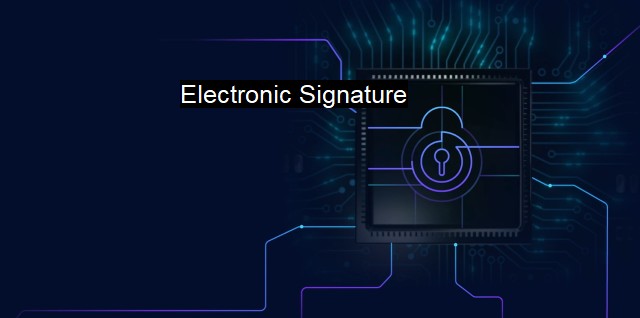What is Electronic Signature?
Ensuring Security and Legal Validity: The Growing Importance of Electronic Signatures in Cybersecurity and Antivirus
Electronic signatures are digital representations of traditional pen-and-paper signatures, enabling individuals and businesses to sign legal documents or papers remotely in our burgeoning digital landscape. As the name implies, these signatures are electronic, making it convenient for businesses to send, authenticate, and manage legally confidential documentation without the trouble of having them physically signed and couriered.An electronic signature is capable of withstanding judicial review because the court can identify who has signed it, establish when the document was signed, and review the history of how the document was signed. Unlike traditional methods, electronic signatures are quick, effortless, and apt for modern business requirements, especially in the current world where remote work and globalization are becoming ubiquitous.
The ease and availability of such signatures also make them an attractive target for cybercriminals. This is where electronic signatures are restricted with requiring the protection of an antivirus solution.
Electronic signatures are encrypted to avoid unapproved access to sensitive documents and preserve their integrity. Electronic documents are secured with layers of protection and usually require at least a 2-factor authentication against any malicious attack.
These signatures require digital certificates authenticated by a trusted Certificate Authority (CA), which guarantees that the signature is unique to the signer, certifying that the user applying it is the authorized person, proving the identity of the person making the transaction.
Digital signature technology incorporates cryptography techniques, and utilizes a particular algorithm to ensure that the signature is genuine, was placed consensually, and that the document wasn't tampered with after it was signed off.
This level of digital encoding for electronic signatures serves a great purpose in maintaining data sovereignty and putting faith in remote businesses. cyber-breaches are progressively sophisticated and advanced, and thus, call for modern antivirus systems to protect against potential threats, vulnerabilities, and breaches.
A proactive antivirus software would tackle security-related issues, and monitor any abnormal activities that can be a potential threat to the electronically signed documents. They serve as the first line of defense against phishing attacks, malware, or ransomware encryption attacks, that are designed to attack sensitive signed documents and gain unauthorized access. Antivirus software provides an encrypted, safeguarded and durable digital environment that deters these threats, giving an enhanced level of assurance and security.
These antivirus programs protect against any unauthorized changes to the electronic documents by monitoring the alteration of the file’s content, thus ensuring that the integrity of the signature is maintained without being counterfeit.
Modern antivirus software also has periodic updating capabilities with efficient malware scanning and maintaining log files for heuristic analysis to ensure that electronic signatures remain unscathed and secure during transfers and storage.
An encrypted environment that is secured from any possible viruses establishes consistency in the trust for electronic signatures, and antivirus programs ensure this. The user must be assured that when their electronic signature leaves their system, it remains definitively valid and secured, proofed against cyber threats.
Electronic signatures provide a robust, efficient, and digitized system highly favored in our current global digital age. That said, the protection of electronic signatures is critical and must be proactively managed by deploying up-to-date antivirus software, complemented with good security etiquette to address cybersecurity threats efficiently. Anti-virus software protects the integrity of electronic signatures, striving to prevent unwanted alterations and accurately manipulate instances of unauthorized access to ensure a safe, secure, and authentic digital signing experience.

Electronic Signature FAQs
What is an electronic signature and how is it used in cybersecurity?
An electronic signature is a digital signature that verifies the authenticity and integrity of electronic documents or transactions. It is used to ensure that a document or transaction has not been tampered with and that the person signing it is who they claim to be. In cybersecurity, electronic signatures are used to provide a secure method for signing and approving documents or transactions, helping to prevent fraud and unauthorized access.Is an electronic signature legally binding and recognized?
Yes, electronic signatures are legally binding and recognized in most countries. The legality and the requirements may vary from one country to another, but generally, electronic signatures are considered as legally binding as traditional signatures when certain conditions are met. The electronic signature must be unique to the signer, linked to the document, and must be secured against any tampering or modification.What are the benefits of using an electronic signature for antivirus vendors?
Electronic signature technology offers several benefits for antivirus vendors. It allows them to verify the authenticity of software and updates, ensuring that they are not modified or corrupted. This helps to prevent malware attacks that can harm computers and networks. Electronic signatures also help antivirus vendors to comply with regulations and standards that require secure digital signatures.How do I create an electronic signature?
There are several ways to create an electronic signature, including using software tools, mobile apps, or online services. Some popular methods for creating electronic signatures include using digital certificates, biometric authentication, or 2-factor authentication. You can create an electronic signature by selecting a signing method that suits your needs and that meets the legal requirements in your country.| | A | | | B | | | C | | | D | | | E | | | F | | | G | | | H | | | I | | | J | | | K | | | L | | | M | |
| | N | | | O | | | P | | | Q | | | R | | | S | | | T | | | U | | | V | | | W | | | X | | | Y | | | Z | |
| | 1 | | | 2 | | | 3 | | | 4 | | | 7 | | | 8 | | |||||||